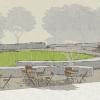ACC Proposes Half a Billion Dollars Worth of SPLOST Projects
City Dope

Citizens have until Nov. 11 to propose projects to be paid for by the next round of a local 1 percent sales tax, provided voters agree to continue the tax next year. Already, a 22-person citizen advisory committee has been named to whittle down the list of suggested projects to those that $159 million in pennies will cover, and county departments have submitted their own lists of desired projects—71 altogether, costing some $500 million combined. The final project list will be decided by ACC commissioners and approved or rejected by voters. Citizens proposing large or small projects must detail the projects, estimate costs and present them to the citizens committee.
As Flagpole previously reported, with an expensive new jail already built, commissioners now have few “must-have” projects this time around and can get on with the “highly wanted” or “nice to have” projects that everybody loves. One of those could be a new multi-story county office building (location undetermined) to combine departmental offices that are now split into multiple buildings, and perhaps sell off several smaller county-owned buildings. The new building would require 5–7 acres, including parking or an adjacent parking deck.
A new study of the space needs of ACC departments suggests selling off the county’s Dougherty Street building, the Costa and Simon Michael buildings near City Hall, the Satula Avenue building, the Prince Avenue IT building and/or the downtown water business office, a former bank that the county spent more than $2 million renovating just a few years ago. Several relocated county departments, courts and judicial offices could occupy the new, larger building, the study suggests, and that could allow other departments to fill the existing courthouse and “convert existing courtrooms into large meeting spaces.” Cost estimates range from $22 million–$91 million, depending on size. Alternatively, separate and cheaper SPLOST proposals would renovate portions of the courthouse, adding more courtrooms and jury rooms and improving courthouse security.
Many of the departmental project proposals are mundane: street repaving, buses and bus stop improvements, 911 phone equipment, stormwater improvements, body cameras and stun guns for sheriff’s deputies, and assigned vehicles for police. Transportation and Public Works requests include traffic calming and supplementary bike and pedestrian funding, plus a $6 million "Vision Zero" program to reduce traffic fatalities. "Athens‐Clarke County is consistently one of the top five worst counties in the state for crash and injury rates [per vehicle miles traveled]," the project description says. "An average of 14–15 people are killed each year in traffic crashes; pedestrians and bicyclists typically comprise 30 percent of fatal and serious injury crash victims." Strategies would include data studies, education, enforcement and infrastructure improvements.
Replacing ACC's aging recycling processing center would cost $12 million, replacing the Whit Davis Road fire station $5 million, airport grant matches $5 million and animal shelter improvements $500,000. A replacement building for jail inmate workers is $20 million, land acquisition for economic development $20 million, a new building with leasable workspace to develop “research institutes, incubators, accelerators, innovation centers, co‐working spaces, start‐up spaces and more” $28 million.
$5 million would buy a new dog park and playground at Memorial Park, plus renovation of the lake and stormwater improvements. $12 million at Bishop Park would replace the pool and playground and renovate fields, courts and restrooms. $4 million is requested for improvements to Cook’s Trail. Improved training facilities for law enforcement officers would include a vehicle training surface—emergency vehicle maneuvers are presently taught in Forsyth County—and a “360-degree” use-of-force simulator. A $28 million water reuse system could provide non-potable water to industry for cooling and irrigation, thus saving on more highly treated drinking water.
None of these projects are assured, and most of those submitted cannot be funded within the budget. Proposals from citizens will further lengthen the list that must be vetted either by cutting out projects or reducing their cost, ending with a list intended both to be substantive and to gain voter approval.












comments